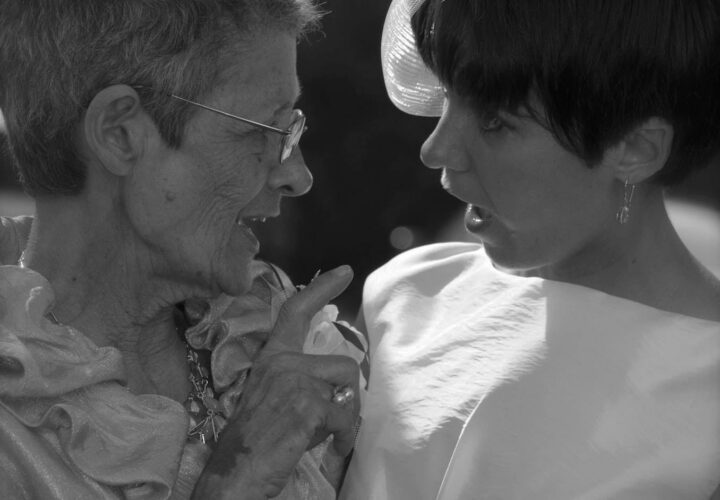Alzheimer's is one of the most common causes of death. What can caregivers do to make the last days for someone with late-stage Alzheimer’s more comfortable? Here are a few ways to help someone with late-stage Alzheimer’s feel calmer and more comfortable as death nears.
Alzheimer’s is one of the most common causes of death. What can caregivers do to make the last days for someone with late-stage Alzheimer’s more comfortable? Here are a few ways to help someone with late-stage Alzheimer’s feel calmer and more comfortable as death nears. Watching a loved one die of Alzheimer’s is as unpredictable as it is painful. In an essay by Jasja De Smedt Kotterman about Alzheimer’s, death, and what she wished she had known as she watched her mother go through the final stages of the disease, she recommended asking doctors about what you can do to make your loved one feel more comfortable and when drugs are unlikely to bring any more comfort.
In a Being Patient LiveTalk with Kotterman, Liz Sampson, an expert in end-of-life-care and a professor at University College London shared other ways to make end-of-life care for a person with Alzheimer’s or dementia more comfortable.
In the best-case scenarios, she says, families will have already had frank conversations with one another about their end-of-life wishes.
Talk to your loved one about their end-of-life wishes
“Luckily, my mother had always been specific throughout her life about how she wanted to die,” Kotterman told Being Patient. This made it easier to make end-of-life decisions and funeral decisions. Kotterman’s father did not however tell his wife that she had Alzheimer’s, even as she was being tested and placed in community care.
“It was the more compassionate one because she then forgot why she was in the care home and got comfortable,” Kotterman explained. However, it isn’t common for people to talk about death and end-of-life wishes candidly.
In the best-case scenarios, families will have
already had frank conversations with one
another about their end-of-life wishes
before dementia becomes a factor.
“There’s a big taboo in society about talking about death, but any one of us could be knocked over by a bus and end up in intensive care,” Sampson said. It doesn’t mean that everyone needs to fill in legal documentation this evening at the dinner table, but they should consider making time to discuss their wishes in such a situation with their loved ones.
“The problem is that lots of people who have dementia — and perhaps it’s a blessing — don’t have insight into that, because the part of the brain that gives us insight and self-awareness is affected quite early on in dementia,” Sampson said of end-of-life preferences for people who already have advanced Alzheimer’s or dementia.
It’s important to talk to family members when they are healthy and fully aware of all the repercussions of their preferences, she said.
Choose end-of-life care at home, in a community care setting, or in a hospital
Kotterman opted for community care for her mother. Although doctors weren’t always available, she could speak to others who were knowledgeable about the dying process.
“I think it’s good to have people with experience around you who can guide you through the process,” Kotterman told Being Patient.
While feelings of guilt are a common part of the decision to choose community care or a hospital instead of home for an end-of-life setting, experts remind us that if it provides the best care, it may be the best choice.
“When facing the death of a loved one
with Alzheimer’s, it’s good to have
people with experience around you
who can guide you through the process.”
Hospitals in the U.K. use a document called “Ten Things About Me” to ease the distress of going into acute hospital care. The document includes their name, what they like to eat and what music they like. The best place for your loved one’s final moments depends on the situation and where the most help and support is available.
“We can get very hung up on the place of death, rather than thinking about the quality of what’s given there,” Sampson added.
While there are many things about Alzheimer’s that are seemingly impossible to prepare for, discussing wishes in advance is one way to lay the groundwork for a more comfortable end of life.

Recognize when death is near
It’s very hard to tell precisely when someone is going to die, but according to the Mayo Clinic, there are a number of common signs that appear in the final days or hours of life, such as:
- Restlessness, confusion, and agitation
- Increased tiredness and sleep
- Loss of interest in eating or drinking
- Irregular breathing, irregular sounds when breathing, or pauses in breathing
- The hands or feet may swell or appear blue-ish in color
- The person who is dying may report seeing or dreaming of someone they know who has already died
Creating a calm, comforting atmosphere in end-of-life care
While a person might appear unresponsive in these end-of-life stages, Sampson said, it is important for caregivers to try not to appear too distressed, as even those who are near the end of life with late-stage Alzheimer’s can sense the atmosphere.
Pay attention to the temperature of the room and ensure it is comfortable. Keep volume levels hospitable, speak calmly and reassuringly, and hold the person’s hand or provide a gentle touch if it is comforting to them. Remind them person where they are and who is with them to help address confusion.
“For loved ones with Alzheimer’s, we can get
very hung up on the place of death, rather
than thinking about the quality of what’s given there.”
“It’s helpful being surrounded by nice smells or music, which reach the inner parts of our brain and trigger basic emotional responses in us,” Sampson told Being Patient.
Music therapy has proved beneficial across different stages of Alzheimer’s, helping to reduce anxiety, and even boosting mood and cognition. Likewise, because of the link between the brain and our sense of smell, pleasant and familiar scents can help people living with Alzheimer’s tap into good feelings and memories.
Here are some of the other ways caregivers and loved ones may provide more comfort to someone who is dying.
Loss of appetite:
If a person is not eating, try feeding them small spoonfuls of food, and use ice chips or a damp sponge to keep the mouth moist.
Skin irritation or dryness:
Apply a soothing damp cloth around the eyes, keep lips moist with lip balm or petroleum jelly, gently apply lotion to dry skin, and mind bed sores.
Difficulty breathing, incontinence, and pain:
Difficulty breathing may be eased through readjusting pillows or the head, or introducing a cool-mist humidifier. Consult with the person’s caregiving and medical team about the use of oxygen to ease difficulty breathing, the use of a catheter to help reduce discomfort around incontinence, and about anything pertaining to pain medications.
When the end of life is near, families like Kotterman’s may find some solace in knowing that there are things they can do to make the last days less fearful and more comfortable.




I am an end of life doula with a very young husband (at age 59) diagnosed with Alzheimer’s. Thank you for this article. We as EOLD are specifically ready to hold the space for all of the comfort and care to take place. Again, thank you. Holly S.